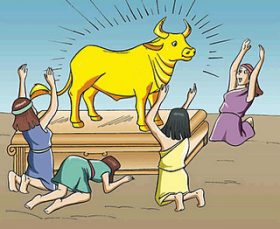
Genuine idolaters (courtesy of JewishSpiritualRenewal.org)
A couple of weeks into the Occupy Wall Street uprising, the movement began to reveal a “spiritual side,” as USA Today headlined it, and since then the prophetic showing has been emphatic at the demonstrations in New York, Boston, and elsewhere. Like other occupiers, the spiritual ones are piqued by corporate greed. A number of them take the further theological step of declaring that Wall Street worships false gods, namely money.
In a detailed roundup for Religion News Service, correspondent Jack Jenkins described one bracing scene in New York on October 9:
On Sunday, a diverse group of New York religious leaders marched to Zuccotti Square carrying a handmade golden calf fashioned to resemble the iconic bull statue near the New York Stock Exchange.
“We think Wall Street has become idolatrous,” said the Rev. Donna Schaper, senior minister at New York’s Judson Memorial Church and one of more than 50 clergy who joined the New York protest, independent of the chaplains group.
“I’m not saying God is against the people of Wall Street, but I think God is sick of Wall Street taking more than they deserve.”
The golden calf harkens back of course to the Exodus account of when Moses went up Mount Sinai, leaving the Israelites to their own spiritual devices for 40 days and nights. Not knowing when or if he’d get back to guide them in faith, the Israelites molded the object out of golden earrings, and bowed to it.
The biblical motif is resonating in the choir lofts of the 99 percent. “We believe that too many in our culture worship the false idols of profit and selfishness, which all too often comes at the expense of others,” declared the Washington group Catholics United, which is an organizing a “Catholics Occupy K Street” presence at D.C. rallies.
Where’s the Path?
It’s hard to argue with the proposition that greed is ungodly and that it helped trigger the financial dissolution that has finally sent people into the streets. Still, pronouncing on the mortal sins of one’s political opponents—as much fun as that could be—isn’t the only option for faith-based activists. It’s possible to speak up for economic justice without declaiming against idol worship and other evil-doing.
The spiritual occupiers have offered glimpses of this possibility, even as they’ve paraded with the young bulls. As Jenkins noted, they’ve also held signs reading “Blessed are the Poor,” which is a social theology in itself. They’ve invoked biblical teachings like the Golden Rule, which would, in this context, discourage behavior that enriches some people while impoverishing others.
All of the major faith traditions represented in the occupation (and they are a big interfaith tent) have systems of social ethics with teachings about wealth and poverty. These include what is phrased in Catholic social teaching as “the social mortgage” (fortuitously, in light of Wall Street’s mortgage meltdown), which fixes a public claim on a portion of private wealth. Part of the idea is that the accumulation of wealth is inconceivable apart from social relationships and public institutions.
And yes, there are times when a faith community has to name certain patterns of social, political, and economic behavior as sinful (if not demonic, which is a sort of nuclear option). It’s hard to get this right, when speaking in the public square. How do you balance prophetic denunciation with public discourse that continues rather than ends the conversation? Where’s the path to moral and political consensus?
This past weekend at the dedication of the new monument to Martin Luther King, Jr., on the National Mall, President Obama spoke intently to the question. He said King realized that to “bring about true and lasting change, there must be the possibility of reconciliation; that any social movement has to channel this tension through the spirit of love and mutuality.” The president added that King would remind us today that people can and should “challenge the excesses of Wall Street without demonizing all who work there.”
And that’s what the occupiers, both spiritual and not so much, have been doing on their good days. …read more





